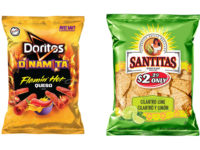Tortilla chips continue to evolve and excite
















Americans’ love of Mexican food and tortilla chips’ reputation as being a better-for-you snack has drawn many consumers to the category throughout the years. Now, all-natural, nonGMO ingredients and interesting new flavors and shapes will keep them coming back.
Even before consumers began scrutinizing the ingredients in their favorite snacks, tortilla chips had a reputation for being a better snack option than potato chips and many other products. Most tortilla chips’ ingredients lists are short, comprising only yellow or white corn, vegetable oil and salt. As tortilla chips made with noncorn grains and flavorings started appearing on store shelves, consumers began taking note.
“Consumers are getting more hip to what’s in their food, even learning the differences in the oil that the chips are fried in,” says Michele Kropp, chief operating officer/chief marketing officer at Gringo Jack’s in Manchester Center, VT, a restaurant that makes and sells handmade flour tortilla chips and salsa. “Processed food is being seen for what much of it is—full of ingredients you don’t want in your food. As a result, supermarkets are adding ‘natural’ and organic aisles to their stores, thereby creating two separate aisles for chips. This opens up room for new, smaller and, in many cases, higher-quality chip companies to compete with the big boys.”
On display for the first time at the Sweets & Snacks Expo in Chicago in May, Gringo Jack’s Flaky Tortilla Chips line features four varieties: Plain Flour; Spiced Flour; Whole Wheat Flour; and Cinnamon & Sugar.
The chips contain no preservatives, fillers or high fructose corn syrup. “If you note the oils, we are using the best oil for frying chips with the highest monounsaturated level and a 2:1 ratio of Omega 3s to Omega 6s,” says Kropp. “This commitment to use only expeller-pressed, nongenetically modified (nonGMO) canola oil sets us apart from most other chip companies.” Recently certified kosher, the chips are now also in the process of becoming verified nonGMO.
Gringo Jack’s Flaky Tortilla Chips are for anyone who wants “excitement in their snack, instead of the same old, same old,” says Kropp. “While we know that we are a snack and, therefore, an indulgence, we make sure that we put in only quality, so that people can at least feel good about what they are eating.”
Larry Deal, president of CoPak Solutions Inc., Conover, NC, expects demand for nonGMO and organic product to still be “pretty high on the radar,” in the next few years. “Right now, nonGMO has really taken off with the young generation,” he says. “I think they’re taught from kids on up now about genetically modified organisms. We’re trying to get [our Mother’s Farms products] Non-GMO Project verified—it’s a long process. We’ve been certified organic for about eight years.”
On the market for about two and a half years, Mother’s Farms Tortilla Chips are made from whole grains and are certified organic, gluten-free, trans-fat-free, cholesterol-free and are nonGMO. They come in four varieties: Multigrain; Pumpkin Seed; Sweet Corn & Black Pepper; and Sweet Potato. “We’ve taken our time with these products,” says Deal. “We’ve been playing with the Pumpkin Seed for four years. The Multigrain took three to four years to develop—the same with the others. We use real ingredients and don’t use seasonings. Seasoned products are just manufactured products.”
CoPak Solutions also recently partnered with celebrity chef Emeril Lagasse to develop Emeril Tortilla Chips, which it launched at the Sweets & Snack Expo, and plans to take all over the country. The gluten-free chips come in three flavors: Essence; Bam! BBQ; and Sweet Potato.
A company that recently did receive Non-GMO Project verification for its tortilla chips is Austin, TX-based Paqui Tortillas, which makes tortillas and tortilla chips “using pretty much organic or nonGMO-verified ingredients,” says “chief happiness officer” Doug Lyon.
Paqui Tortilla Chips come in six varieties: Original Delights; Cowboy Ranch; Roasted Jalapeno; Grilled Habanero; Haunted Ghost Pepper; and Very Verde Good. The latter flavor is the most recent addition to the line, says Lyon.
Clearly a trend
“Ingredient transparency is a big trend right now in the food space,” says Brett Hartmann, senior brand manager, snacks, at The Hain Celestial Group Inc., Boulder, CO, which owns the Garden of Eatin’ brand. “Garden of Eatin’, which is made from nonGMO ingredients and organic corn, is working to raise awareness about the importance of food labeling, so consumers know exactly what’s in all their food choices and can make an informed decision.”
In March, Garden of Eatin’ introduced Garden of Eatin’ Butternut Squash Corn Tortilla Chips, crunchy, gluten-free snacks made from a blend of butternut squash and organic yellow corn lightly seasoned with sage and a hint of roasted onion. According to Hartmann, the chips are one of the first butternut squash-flavored corn tortilla chips on the market.
Other Garden of Eatin’ tortilla chips offerings include blue, white, yellow and red corn; Beet & Garlic Veggie; Black Bean; Maui Onion; Focaccia; and Little Soy.
The ins and outs
For many tortilla chip lovers, what’s in their favorite snack is just as important as what’s not. “We believe the new trends are all based on unusual ingredient combinations and bases of ancient grains to whole grain corn,” says Roya Rohani, vice president of marketing at Balance Foods, San Francisco, adding that good taste and low sodium levels are important consumer trends, too.
“We are reformulating and reintroducing our Poptillas and our California Classics to be school-compliant with more whole grain, lower sodium and great taste,” she says. “Also, we have great demand for reformulation from our private-label customers as far as nutrition and ingredients (such as quinoa, pea protein or soybean) added to the final product.”
Quaker Oats Co. marketing manager Sofia Colucci also says whole grains continue to be in demand. As a result, the Chicago-based company recently introduced Quaker Tortilla Style Chips, which offer 13 g. of whole grains per serving and are a good source of fiber. They come in Tangy Ranch and Cheesy Nacho.
“Better-for-you options continue to be a hot trend within the category,” Colucci notes. “However, they have evolved from being tasteless and less palatable to delicious and appetizing.”
Carlos Gonzalez, founder and “chief cassava officer” of Sorilito Foods LLC, concurs: “Better-for-you is definitely the upward trend. We find that inclusions, such as flax seed and quinoa, are what the more health-conscious consumer is seeking out. This coupled with gluten-free and nonGMO are the major hot buttons, from our observations and in-store samplings.”
The Bethel, CT, company introduced two new products at the Snacks & Sweets Expo that address these trends. It’s NoTatoes Cassava Tortilla Chips are made from cassava, “the potato’s ugly cousin,” according to Gonzalez. Available in Multi Grain and Simply Sea Salt, both varieties are nonGMO, gluten-free and kosher, and fried in sunflower oil.
Available in late July/early August, Yucatillas—yuca tortilla chips—are all-natural and fried in cottonseed or corn oil. Available flavors will be Chili Lime and Nacho Cheese.
Different shapes, brighter flavors
“Tortilla chips are a big part of our business,” says Joe Papiri, vice president of sales, Snak King, a City of Industry, CA, snack manufacturer that produces tortilla chips under several of its own brands—The Whole Earth, El Sabroso and Granny Goose—as well as private-label brands.
“One of the major categories that we’ve been working on for a while—and are rolling out more products in over this past year—is the rolled tortilla chip category,” he continues. “We have a product [under the El Sabroso brand] called Taco-Litos. We’ve recently taken it and looked at some different upscale formats that could go into the natural foods category.”
Snak King marketing manager Jeff Roberts adds that the company is also seeing more inclusions being added to tortillas—“everything from bits and pieces of vegetables to fruit. Then, obviously, getting into the seasoning side, it’s wide open.”
And while the company sees continued consumer interest in spicy and ethnic flavors (especially among young consumers) and does offer hot flavors for some of its product categories, Papiri says “not so much,” when it comes to its tortilla chips. “We like to have a flavor profile behind [the heat], rather than just something that’s just going to sizzle your tongue. Our Baja Limon fits a lot of this because you’re getting the heat, but also the balance of citrus.”
Papiri also adds restaurant-style tortilla chips to the list of tortilla chips trends. “The super-extra thin tortilla chips is kind of a growing area as well,” he says.
Trying to do it all
While tortilla chips manufacturers are successfully addressing all of consumers’ demand for an even better tortilla chips, doing so is often challenging, given fluctuating ingredient costs and availability, competition, branding needs and more.
“My fear is the price of corn,” says Deal. “A couple of years ago, it just went through the roof. Oils are a little volatile right now, too. I don’t know why. I’m afraid the price could be detrimental to us in the future.”
Lyon, too, says corn costs are a big concern, at times, because of their volatility. “I think the biggest issue now is how do you differentiate your product,” says Papiri. “Competition is really the biggest challenge.”
Rohani agrees. “There are so many selections out there, that the consumer can be confused,” she says. “Staying focused on branding and addressing consumer needs is a priority.”
For small and new companies, this issue can be even more challenging. “As a small manufacturer and brand, it’s always going to be the high cost of entry when competing with the big players,” says Gonzalez. “It goes back to getting the consumers’ attention when introducing a new product.”
Growth strategies
So how do today’s tortilla manufacturers intend to continue to bring customers into the category and remain competitive?
“Stay on the cutting edge,” says Kropp. “Boring is out—new is in. And by new, I mean [introducing] new flavors in the tortilla field and adding functional ingredients.”
Similarly, Gonzalez says manufacturers must introduce “creative, exotic flavors that pique consumers’ desire to try more worldly flavors.”
“I see more exotic flavors, really different flavors,” says Deal. “I believe that you have to come out with something that’s just really, really, really different. I’m looking at putting fruit into tortilla chips. It’s a little different, a little on the cutting edge.”
In addition to new tortilla chip flavors, Papiri expects continued growth in some of the different styles of chips and in restaurant-style chips.
Roberts, meanwhile, believes the rolled tortilla chip segment will continue to evolve and grow. “Right now, there’s one major player,” he says. “Most of its consumers are likely younger, again going after that hot experience. A lot of people like the crunch and the feel of rolled tortilla chips, but they don’t necessarily want the heat or a bunch of seasoning left on their hands. As we try to expand that whole segment—getting into different inclusions, getting into organic—we may bring it to an older consumer.”
Given that Americans are snacking more than ever before while simultaneously trying to snack healthier, the demand for all-natural tortilla chips is likely to continue growing. “We have seen a tremendous rise in natural foods, and particularly the natural snacks category,” Hartmann says. “According to Organic and Wellness News, Packaged Facts found that 20% of all meal occasions are snacks, and U.S. Snack World magazine found that consumer demand for healthy snacks was at 6.4% annual sales growth last spring.”
Hungry for new things
Like other snack manufacturers, tortilla chips manufacturers will have to find new and creative ways to garner customers and compete in an increasingly crowded and evolving industry. And they will.
“Tortilla chips aren’t going anywhere,” says Kropp. “They are just like potato chips, pretzels and popcorn in that respect. The industry just needs to continue to innovate.”
Says Hartmann of the category, “We expect natural and organic snacks will continue to disrupt the overall tortilla chip category and are excited about upcoming innovations and continuing to deliver great-tasting tortilla chips with natural and organic ingredients to consumers.”
Gonzalez is equally enthusiastic about the category’s outlook: “There’s a tremendous amount of opportunity for companies that can be nimble and creative in all areas—distribution, promotions, social media, flavors. The consumer is hungry for new things. We, as manufacturers, just need to have the ability to push through the crowd and deliver products that are uniquely different. Most importantly, we need to have the financial wherewith all to stay around to reap the rewards of our work.”
Looking for a reprint of this article?
From high-res PDFs to custom plaques, order your copy today!














